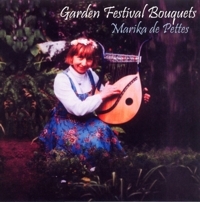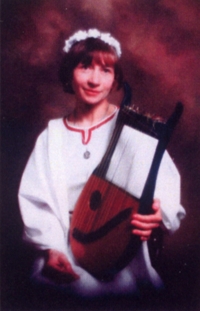Garden Festival Bouquets by Marika de Pettes
Marika de Pettes plays a beautiful selection of music, from around the world, on the small 15 string Lyra and the big 22 string Lyra for your enjoyment Buy this album now CD: £12.00 + p&p |
| Tracks 1-18 played on the small 15 string Lyra | ||
| 1 | Prelude to St Cecillia | M de Pettes |
| 2 | Improviso | M de Pettes |
| 3 | O sanctissima | Early chant |
| 4 | Hatikvah | Israeli anthem |
| 5 | Never on Sunday | Greek |
| 6 | O Sole Mio | Italian |
| 7 | Easter Carol | English |
| 8 | Spring | F Shubert |
| 9 | Blessed Cherry Tree | M de Pettes |
| 10 | Ritka Buza (Sparce Wheat) | Hungarian folk song |
| 11 | The Cricket's Wedding | Hungarian folk song |
| 12 | Ode to Joy (from Choral Symphony No 9) | Beethoven |
| 13 | Papillon | R Schumann |
| 14 | Ballet (part 1) from Orfeo & Eurydice | Gluck |
| 15 | Au Fond du Temple Sainte (Pearl Fishers | Bizet |
| 16 | Grand March (1st part) Aida | G Verdi |
| 17 | Theme from Madame Butterfly (Act 3, Scene 2) | G Puccini |
| 18 | Spring | Mozart |
| Tracks 19-38 played on the big 22 string Lyra | ||
| 19 | Mayim Mayim (Water well) | Israeli folk song |
| 20 | Cretan Dance song | Greek folk song |
| 21 | Agnus Dei(from Missa Sanctae Ceciliae) | M de Pettes |
| 22 | Improviso Intermezzo | M de Pettes |
| 23 | The trout (Die Forelle) | F Schubert |
| 24 | Dance of the Blessed Spirits, Orpheo and Eurydice | Gluck |
| 25 | Magic Bells (Magic Flute) | W A Mozart |
| 26 | Aria della Provence (La Traviata) | G Puccini |
| 27 | Love Duet theme (Madama Burrerfly | G Puccini |
| 28 | Pastoral Symphony (Messiah) |
G F Handel |
| 29 | Sheep may safely graze (Birthday Cantata) | J S Bach |
| 30 | Minuet in G | Paderewski |
| 31 | Polish anthem |
|
| 32 | Two Hungarian melodies: Theme from Hungarian Fantasia Hungarian Dance No 5 |
F Liszt Brahms |
| 33 | Kalinka | Russian folk song |
| 34 | Last Rose of Summer | Irish folk song |
| 35 | Militzi (Apple Tree) | Greek folk song |
| 36 | Little Shepherd | Hungarian folk song |
| 37 | Rowan Tree | Scottish folk song |
| 38 | Medley: Ye Banks and Braes, Loch Lomond, Country Gardens | Scottish Percy Grainger |
Sleeve Notes No notes with this CD. The biographical details from the CD book are reproduced in the Artist Information panel below. |
Credits Recorded at the Glasgow Garden Festival
1968 |
| Instruments: | Lyra |
| Genre: | Classical |
| Format: | CD |
| Our Ref: | A0156 |
| MCPS: | MPCD001 |
| Label: | Marika de Pettes |
| Year: | 2006 |
| Origin: | UK |
It was in this Postgraduate year that Marika's interest in the Lyra grew, with the hope of reviving the instruments popularity for 3 important reasons; biblical, historical and educational. She incorporated this into her research work as part of her training, and composed the music to the stage version of the Life of St cecilia, using a cardboard template of a Lyra as a compromise to the real thing. Prior to that, she had been so moved by a picture of St Cecilia playing a Lyra, she was motivated to bring the instrument back to the public's interest. Then two primitive mahogany Lyras were made by the craftsmen of Kilgraston school, one of which had cow's horns given by the butcher in Merchiston, Edinburgh. During Marika's twelve year class teaching in and around perthshire, she spent three years being tutored by the late Sanchia Pielou, acquiring a small pedal harp from an antique shop in Perth. The first professional 15-string Lyra was made in 1972, from pine and sycamore, by John Hoare (who now represents Pilgrim Harps) who was then an apprentice with Wilfred Smith Harp manufacturer. It was a birthday gift from her mother, completed in time for Marika and her mother's first pilgrimage to the Holy land where she accompanied the hymns on the Lyra, and later in the Basilica in Rome, both in a Folk group for Evening Mass and solo in the crypt. A second bigger Lyra with 22 strings and levers was fashioned three years later in1975. both Lyras were played regularly at alternative days, and in the chapel, home and for the pupils. She was now expanding the repertoire for the Lyra, setting a number of Psalms to music and composing solo pieces and duets for the Lyra and flute. She composed and orchestrated her first Overture in 1980, after her experiences in ancient Rome. She has also written a cycle of 16 poems, inspired by the Lyra and harp entitled "Music from the Woods". In 1988 Marika made a professional recording for the Lyra during the Glasgow Garden Festival, while also performing there on piano and organ, and was then invited to play the Lyra for The Beechgrove Garden on Radio Scotland. In 1984 Marika founded The St Cecilia Mission Fund, raising funds for British homeless day centres, third world relief, Bible Lands Aid and LEPRA. She now regularly plays organ in the church. The Lyra never leaves Marika's side -in recent years, she has contributed her Lyra playing in the Edinburgh International Harp Festival, "A heavenly experience" she says, enjoying learning new music and the social aspect. "We are always learning". Her compositions have included; a selection of celebration songs; carols sung and recorded for Radio Clyde at Paisley Abbey; an Advent Mass; a suite of piano pieces based on the Nativity, "Starry Snowflakes" (Piano Fantasia) and twelve Butterfly Pieces for Piano, eight of which are already published, intended for a Children's Ballet. |

